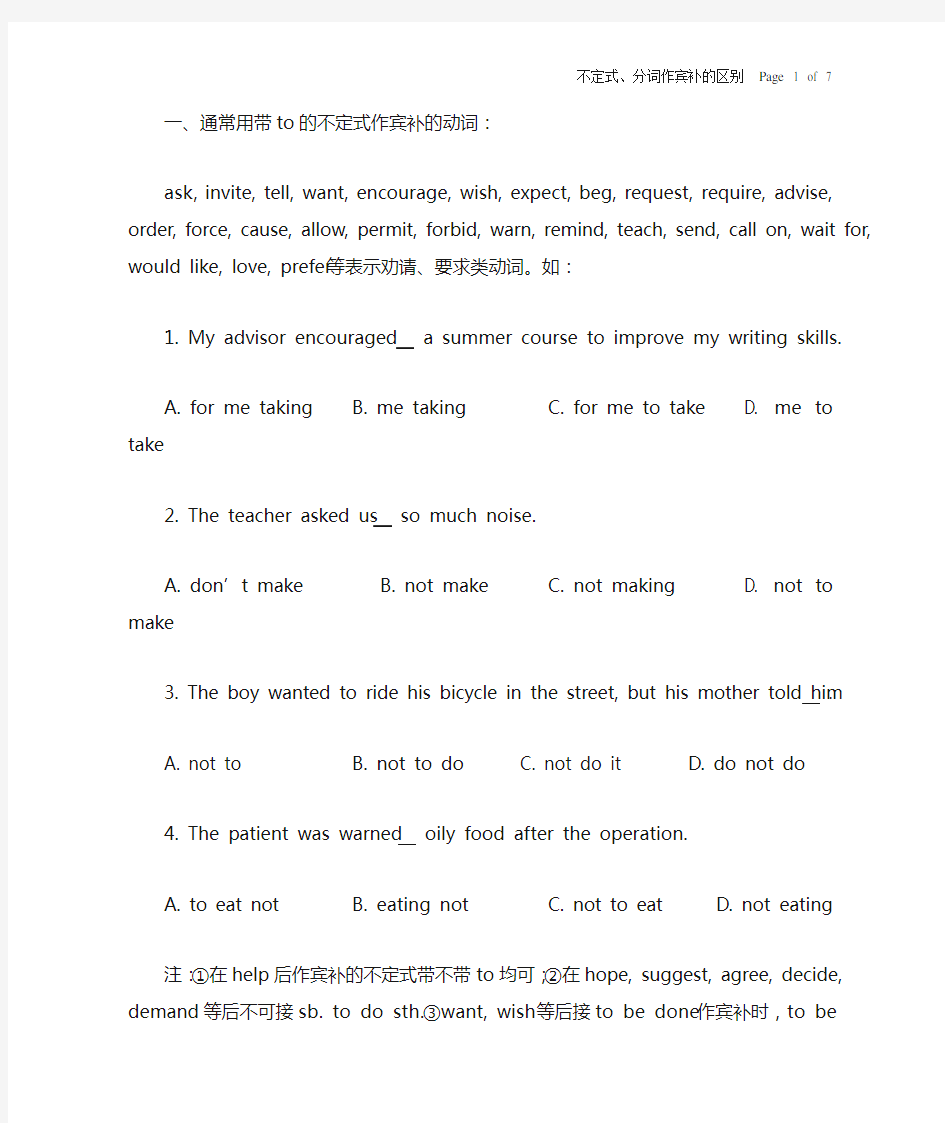不定式与分词做宾补区别

- 1、下载文档前请自行甄别文档内容的完整性,平台不提供额外的编辑、内容补充、找答案等附加服务。
- 2、"仅部分预览"的文档,不可在线预览部分如存在完整性等问题,可反馈申请退款(可完整预览的文档不适用该条件!)。
- 3、如文档侵犯您的权益,请联系客服反馈,我们会尽快为您处理(人工客服工作时间:9:00-18:30)。
一、通常用带to的不定式作宾补的动词:
ask, invite, tell, want, encourage, wish, expect, beg, request, require, advise, order, force, cause, allow, permit, forbid, warn, remind, teach, send, call on, wait for, would like, love, prefer等表示劝请、要求类动词。如:
1. My advisor encouraged a summer course to improve my writing skills.
A. for me taking
B. me taking
C. for me to take
D. me to take
2. The teacher asked us so much noise.
A. don’t make
B. not make
C. not making
D. not to make
3. The boy wanted to ride his bicycle in the street, but his mother told him .
A. not to
B. not to do
C. not do it
D. do not do
4. The patient was warned oily food after the operation.
A. to eat not
B. eating not
C. not to eat
D. not eating
注:①在help后作宾补的不定式带不带to均可;②在hope, suggest, agree, decide, demand等后不可接sb. to do sth. ③want, wish等后接to be done作宾补时,to be可省略,直接过去分词作宾补。如:When do you wish it (to be) finished?
二、在使役动词make, let, have后,一般用不带to的不定式作宾补,但在其被动式后作主语补足语时,要加上to。如:
1. Though he had often made his little sister , today he was made by his little sister.
A. cry, to cry
B. crying, crying
C. cry, cry
D. to cry, cry
2. Paul doesn’t have to be made . He always works hard.
A. learn
B. to learn
C. learned
D. learning
三、感官动词feel, listen to, hear, see, look at, watch, notice, 等后面的宾语与作宾补的非谓语动词在逻辑上是主动关系时,用不带to的(在被动式后作主补时要加to)不定式(全过程)或者现在分词作宾补(正在发生);是被动关系时,用过去分词作宾补。如:
1. They knew her very well. They had seen her up from childhood.
A. grow
B. grew
C. was growing
D. to grow
2. The missing boy were last seen near the river.
A. playing
B. to be playing
C. play
D. to play
3. The managers discussed the plan that they would like to see the next year.
A. carried out
B. carrying out
C. carry out
D. to carry out
四、在with的宾语后,若用过去分词,表示宾语与过去分词在逻辑上是被动关系,且意味着该动作已经完成;若用现在分词,表示宾语与现在分词在逻辑上是主动关系,且表示动作的持续进行;若用带to的不定式,则表示将来的动作,宾语与不定式在逻辑上可以是主动关系也可以是被动关系,注意此时的不定式不是作宾补而是作宾语的定语了。如:
1. The murderer was brought in, with his hands behind his back.
A. being tied
B. having tied
C. to be tied
D. tied
2. With a lot of difficult problems , the newly-elected president is having a hard time.
A. settled
B. setting
C. to settle
D. to be settled
3. Peter soon fell asleep with the campfire still .
A. burning
B. burnt
C. being burnt
D. to burn
五.1. leave…doing让…一直(主动、持续进行);leave…to do让…去做(主动、将来);leave…done(被动)。如:Don’t leave the water while you brush your teeth.
A. run
B. running
C. being run
D. to run
比较:leave the door firmly fastened; leave her to do as she likes
